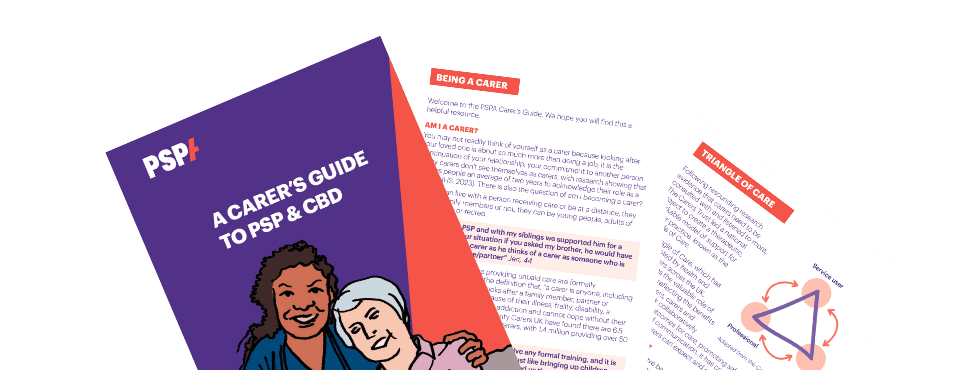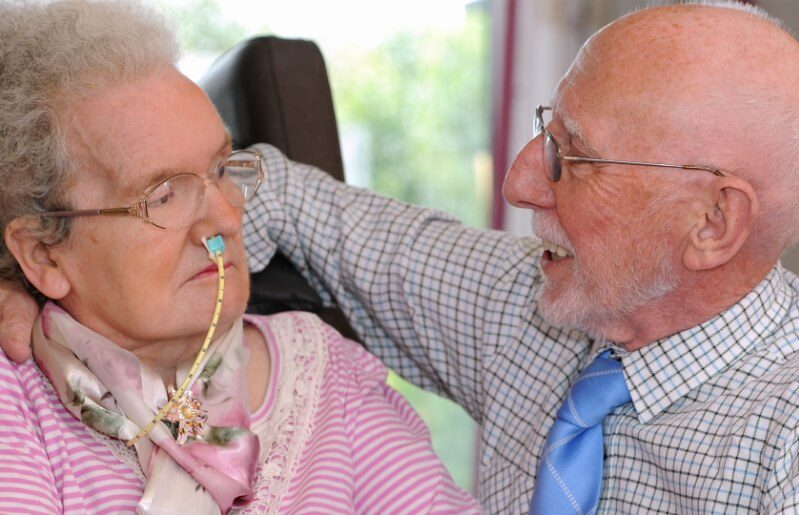Caring for someone living with PSP or CBD
Caring for someone living with Progressive Supranuclear Palsy (PSP) or Corticobasal Degeneration (CBD) presents a unique set of challenges and responsibilities that only people who live it can fully understand. At PSPA, we recognise the invaluable role PSP & CBD carers play in the lives of everyone affected by these complex conditions. Caring for or supporting someone living with the conditions can be a rewarding experience, but it can also be challenging, isolating, lonely and confusing. But you’re not alone. Our aim is to support you, the carer, as much as we help people directly affected by PSP & CBD.
Navigating the landscape of care for someone living with PSP or CBD can feel overwhelming. Symptoms can evolve and impact every aspect of daily life, from mobility and balance to speech and swallowing, requiring a diverse range of symptoms management and support. Therefore, we aim to try and equip you with the knowledge, tools, and personal connections you’ll need to manage this journey effectively.
Your role as a partner, spouse, family member or friend caring for or supporting someone living with PSP or CBD is vital. Whether you are new to caring or have been in this role for some time, you’ll find plenty of help for carers here, including detailed guidance on various aspects of care, support for maintaining your health and wellbeing, and information on PSPA’s carer support services, such as our Helpline and Support Groups. Our goal is to ensure that you feel empowered, supported, and valued every step of the way. Together, we can create a supportive community and a better future for everyone affected by PSP & CBD.
UNDERSTANDING PSP & CBD
Progressive Supranuclear Palsy (PSP) and Corticobasal Degeneration (CBD) are complex neurological conditions that significantly impact daily life. The progression and symptoms of PSP & CBD can closely resemble other neurodegenerative disorders, such as Parkinson’s and Alzheimer’s, making early and accurate diagnosis challenging. This can lead to delays and misdiagnosis, adding to the frustration and difficulty for people living with the condition and carers alike.
Both PSP & CBD significantly alter the day-to-day activities and independence of the people affected. As the conditions progress, simple tasks become challenging, necessitating comprehensive care and symptom management to enable you and your loved ones to adapt to their changing needs.
Learn more about each condition below:

READ JASON’S STORY OF CARING FOR HIS DAD
Kenneth was diagnosed with PSP in 2018. His son, Jason, shares his experience of PSP and how PSPA helped them both.
PRACTICAL ADVICE AND TIPS FOR CARERS OF PSP & CBD
Daily Care Needs
Supporting someone living with PSP or CBD as they approach daily activities can require adaptability and an understanding of the condition’s progression. As your loved ones’ physical, emotional and cognitive needs change, you may need to review what care and support are required to ensure it is provided at the right stage of progression.
Key aspects you can review include:
Routine and Structure
Try and establish a daily routine to provide consistency, which can be comforting for people living with a neurological condition.
Personal Care
As symptoms progress, where possible, assist with personal hygiene tasks, adapting techniques as needed to ensure comfort and dignity. It’s important to think about which tasks you feel comfortable handling and to recognise when you might need extra support, especially with more personal or physical aspects of care.
Eating and Nutrition
For people with limited dexterity, use adaptive utensils. Monitor dietary needs closely, as swallowing difficulties may develop.
Communication
Try and encourage the use of any remaining verbal or non-verbal communication aids. Speak to a Speech and Language Therapist about introducing tools like communication boards, voice banking or technology.
Medical Management
Regular Check-ups
Maintain regular appointments with neurologists and involve specialists like speech therapists and occupational therapists as needed.
Medication Management
Keep a detailed schedule for medications, understand potential side effects, and communicate with healthcare providers about any changes in condition.
Home Safety
Adapting your living environment can significantly improve safety and accessibility:
Remove Hazards
Where possible, modify your home by removing loose rugs, installing grab bars, and making hallways and rooms easy to navigate.
Adaptive Equipment
Consider tools like lifts, walk-in showers, and customised kitchen utensils to facilitate independence.
Emergency Plans
It is important to have clear, easy-to-follow emergency plans in place, with emergency contacts visible for quick reference. The PSPA “All About Me” form is a helpful tool that lets you share important details about the condition with any health professional involved in the person’s care. Download a copy here.
These tips aim to maintain the quality of life for people living with PSP & CBD and support you as carers in managing the complex needs of your loved ones. Through thoughtful daily care, proactive medical management, and a safe living environment, you can make a significant difference in the wellbeing of individuals living with these challenging conditions.

GET PRACTICAL INFORMATION
AND TIPS BY DOWNLOADING OUR
‘A CARER’S GUIDE TO PSP & CBD’
HOW TO LOOK AFTER YOURSELF
Caring for someone with PSP or CBD can be very rewarding but also emotionally and physically demanding. Taking care of yourself can often take second place, so it is important to think about any carer support services you might need to help manage the challenges of your role.
If you are the main carer, the impact of providing full-time care should not be underestimated. No one can be on the go 24 hours a day, seven days a week. Don’t feel guilty about looking after your own wellbeing.
It can help to discuss your needs with the person you are caring for and other family members so they understand how caring affects you.
Keep reading to learn how best to look after yourself whilst you are caring for your loved one.
At PSPA, we have also created a hub of wellbeing information resources for carers. This hub will support you in your role as a carer or family member of someone living with PSP or CBD.
You can learn more about PSP &CBD carer support by accessing our resources.

Emotional Support
Your emotional wellbeing, as the carer, is often overshadowed by the focus on the person you care for. It’s important to acknowledge the psychological strain that comes with caregiving. Feelings of isolation, stress, and fatigue are common, and addressing these feelings is crucial:
Access to Professional Support
Engaging with mental health professionals can provide you with strategies to cope with stress and emotional turmoil. PSPA can offer support with managing your emotions by helping you to access counselling services. Please get in touch with the PSPA Helpline.
Peer Support
Regular interaction with fellow carers through Support Groups can offer emotional solace and practical support. These groups can be a valuable resource for sharing experiences and coping strategies.
Helpline and Information Services
At PSPA, we offer a confidential telephone and email service as well as a variety of support that may help you with your caring role. Our Helpline team is here to provide emotional and practical support as well as signpost other valuable sources.
Physical Health
Maintaining your physical health is essential for the sustainability of caregiving:
Regular Exercise
Simple activities like walking or yoga can significantly improve your physical health and reduce stress.
Balanced Diet
Eating well helps maintain energy levels and supports overall health.
Rest and Respite
Ensuring enough rest is critical to prevent caregiver burnout. Doctors recommend that we get 7 to 9 hours of sleep per night; however, what we need depends on individuals, their age, their activity levels, health, environment, and responsibilities. If you find you need more sleep speak to your GP or another health professional. Caring for others can seriously affect both our ability to sleep and our ability to function well day to day. Taking regular breaks and allowing time for relaxation helps maintain both physical and mental wellbeing. Utilising respite care or sitting services, where a professional carer temporarily takes over, provides essential time off for self-care and rejuvenation, ensuring you can continue to provide quality support without becoming overwhelmed. The PSPA Support Grant can be provided to help with this.
Support in the community
Support networks can provide both practical help and a sense of community:
Online Carers Support Group
Participating in both online and in-person Support Groups can help you feel less alone and more understood. These groups provide a platform to connect with others in similar situations.
Regional PSPA Support Groups
At PSPA, we provide regular opportunities for families to get together, share experiences and support each other. We offer Regional Support Groups for localised meetings every month or two months. In addition, each year we host a Family Day, providing a relaxed environment for you to connect with others, learn more about the conditions and symptom management, and take part in some fun activities.
LISTEN TO THE EPISODE
Series 1 Episode 10 – Support for Carers
Julia, who cares for her husband Laurie, shares details of the support she sourced in her area in the PSPA Podcast. Listen to the podcast.
SUPPORT AND SERVICES FOR CARERS
Navigating health and social services in your area to get support for you and your loved one can be complex. Initially, you may be able to cope with little support from others. But there may come a time when you will need some extra help. Ask for this when you need it (or even before you think you might need it). This section explains the different sources of carer support available from PSPA, health and social care organisations and other services.

Navigating Healthcare Services
Accessing the right healthcare services involves understanding and coordinating multiple aspects of care. Here are some steps and expectations:
Initial Diagnosis and Specialist Referrals
Early consultation with neurologists and movement disorder specialists is vital since symptoms of PSP & CBD often overlap with other conditions. If your GP hasn’t already, you can request a referral to a local specialist.
Ongoing Healthcare Management
Regular follow-ups with healthcare providers are essential to adjust care plans as the condition progresses. Typically, your Consultant Neurologist will schedule a review appointment with you every six months or as things begin to change.
Multidisciplinary Team Coordination
To address the wide range of symptoms experienced by individuals with PSP & CBD, various specialists, such as speech therapists, occupational therapists, and physiotherapists, may be necessary. Not every area has a multidisciplinary team for people living with PSP or CBD. Check with your consultant or GP if you are unsure.
PSPA Support Services
PSPA offers a variety of services designed to support you, your family member or friend diagnosed with PSP & CBD:
PSPA Helpline
This service provides a direct line to Helpline Care Navigators for information and support.
Support Groups
Both local and online Support Groups help you connect with others in similar situations, offering emotional and practical support. Find a Support Group in your region.
Information Resources
PSPA provides comprehensive resources that give practical information about PSP & CBD for carers, including guides and factsheets that can be really helpful for both you and healthcare professionals unfamiliar with PSP & CBD.
Link Volunteer Service
This service offers personalised support to families, helping them navigate the challenges of living with PSP & CBD.
PSPA Support Grants
These Support Grants help cover the costs of services and equipment that can improve the quality of life for those affected by PSP & CBD.
Find out about all PSPA support services that are available here.
External Resources
Additional support is available through various organisations:
Local Carer Organisations
These provide support, information, and sometimes respite services, helping you manage your responsibilities. Please be aware that some local carers organisations will carry out Carers Assessments. More information about this assessment can be found here.
Adult Social Care Services
This usually includes social workers, care managers, care coordinators and occupational therapists. They can offer a number of services, including a needs assessment for the person living with the condition, carers assessments, provision of equipment and guidance on other services.
Specialist Palliative Care Services
Based in a hospital, hospice or day hospice services, palliative care is provided by a team of health professionals with training and expertise in support for life-limiting conditions.
Other Organisations
A variety of local, regional and national organisations can offer guidance, information, support or funding to you and the person living with conditions like PSP & CBD.
LISTEN TO THE EPISODE
Series 1 Episode 4 – Caring for a Parent
Claire shares her experience of caring for her mum who lived with CBD with the PSPA Podcast. Listen to the podcast here.
FINANCIAL SUPPORT
It is important to consider your financial needs. As time goes on, you may require more care and additional equipment, which can be costly. This guidance below aims to provide an overview of the financial support available.

Financial Support
To help you manage your financial needs effectively so you can access support for yourself and your loved one, read through the following information:
Benefits
Try to familiarise yourself with the benefits that may be available to both yourself and the person you are caring for, such as Attendance Allowance, Personal Independence Payment, Carers Allowance, and Pension Credit. PSPA offers information on how to apply for these benefits and assists with its support grants. Download a guide here.
PSPA Support Grants
Our support grants can provide a one-off payment of up to £300 to help provide an item or service that can help maintain or improve the quality of life for the carer as well as the person living with the condition. Contact the PSPA helpline for information on how to apply.
Local Support
Engage with local councils and community organisations that offer additional financial support and resources tailored to the needs of you and those with PSP & CBD. Use the Government Local Council Finder for help with this.
Planning Ahead
Planning for the future when you are caring for someone with PSP & CBD can provide you with a sense of stability during a challenging time. It can also ensure that the wishes of the person living with the condition are honoured.
Power of Attorney
Setting up a power of attorney allows a designated individual to make decisions on behalf of the person with PSP or CBD should you be required to advocate for them. Understanding the types and implications of different power of attorney agreements is essential.
Advance Care Planning
Discussing and documenting end-of-life wishes and care preferences in advance can ensure that the individual’s choices are respected. Tools like living wills or advance directives are vital in these preparations. PSPA has partnered with FreeWills to provide you with the opportunity to make your fully comprehensive, legally binding will for free.
READ LIZ’S STORY OF CARING FOR HER HUSBAND GRAHAM
Liz began caring for her husband Graham after he was diagnosed with PSP in 2019. Read to learn about Liz and Graham’s experiences and how PSPA helped.
PSPA ARE HERE TO HELP YOU
Caring for someone with PSP or CBD can present unique challenges. Throughout this web page, we have explored aspects of caregiving, from understanding the symptoms and progression of these conditions to managing daily care needs and accessing professional help and services.
If you would like to speak to someone about caring for a loved one with PSP or CBD and find out more about the carer support available to you, please get in touch using the details below. Our Helpline and Information Service can provide a listening ear for you to voice your thoughts, feelings and concerns to. We can also signpost you to useful information and, help you to navigate your local health and social care services and provide referrals to non-means tested benefit applications via the Department of Work and Pensions (DWP) home visiting service.
Our helpline is open Monday to Friday, 9am to 9pm, and is manned by a team of trained Helpline Care Navigators who provide dedicated support for your area. You can contact the helpline at:
Frequently Asked Questions
Am I a carer?
You are a carer if you regularly look after someone who couldn’t manage without your help due to a PSP or CBD diagnosis. You would also be classified as a carer if you are a partner, family member or friend who regularly helps to support a person living with PSP or CBD.
What should I know when caring for someone with Progressive Supranuclear Palsy (PSP)?
Caring for someone living with PSP can be challenging as the condition is progressive. Hence, it is vital to understand and know what to expect. The physical challenges are likely to be around balance, swallowing, communication and mobility. Accessing PSP carer support early, such as the Helpline, Support Groups and resources that PSPA offers, can make a huge difference in how you provide care and look after your wellbeing.
What are the challenges of caring for someone with Corticobasal Degeneration (CBD)?
Caring for someone living with CBD can be challenging due to movement, speech, mood, and cognitive changes that make daily tasks harder. However, accessing CBD carer support early can help manage these challenges and maintain wellbeing.
What kind of support for carers in the UK can I access when caring for someone with PSP or CBD?
Support for carers in the UK includes national charities like PSPA, local carer organisations, adult social care services, and financial advice. By tapping into this support for carers network early, you can reduce isolation, access practical help, and improve your quality of life.
What are the key PSPA carer support services I should know about when caring for someone with PSP or CBD?
Our carer support services include our Helpline, Carer Support Groups, Support Grants, Befriending Volunteer service, and downloadable resources. We also provide information on specific resources such as communication aids, swallowing support, and mobility adaptation.
I am new to caring for someone with PSP or CBD. What PSP & CBD carer advice would you recommend initially?
Start with establishing a routine, understanding the symptoms of PSP or CBD, adapting your home, and linking into a carer peer community. Use guides on “Caring for someone with PSP” or “Caring for someone with CBD” to understand how you can provide better care. Also, don’t forget to look after your own health and reach out if you need support.


